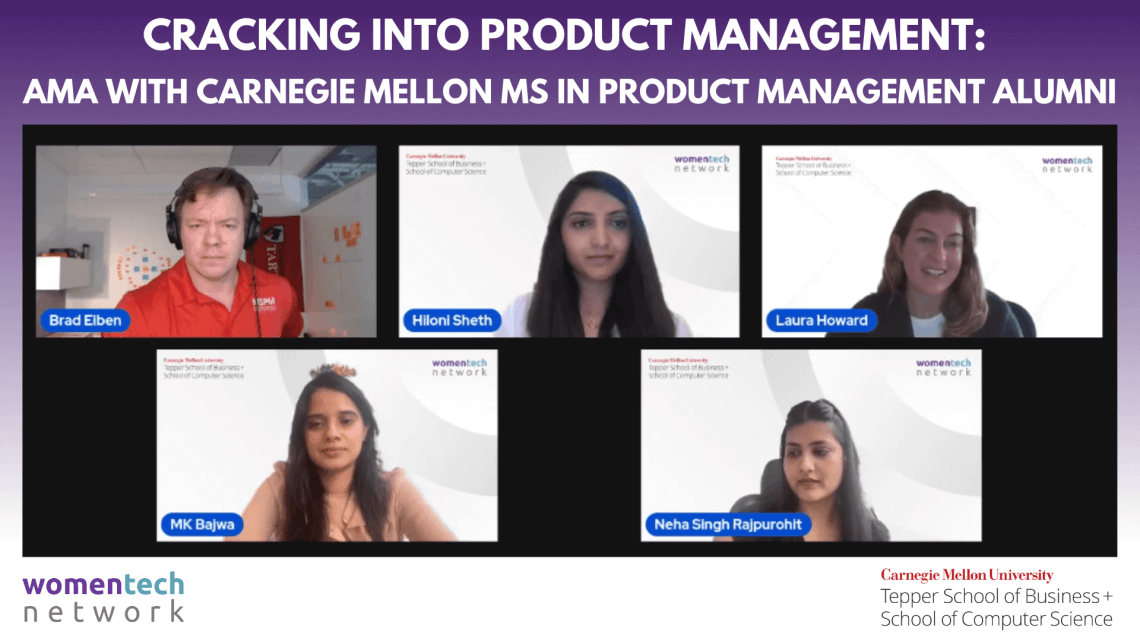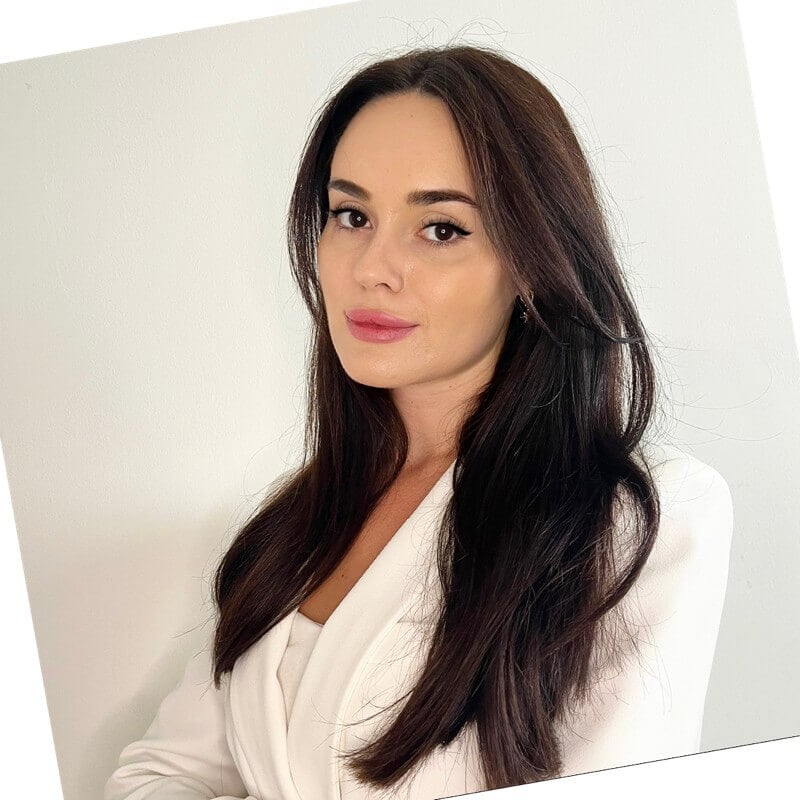
"Cracking into Product Management: Ask Me Anything", hosted by Carnegie Mellon University and WomenTech Network, brought together a panel of accomplished individuals who have successfully navigated the world of product management.
From Brad Eiben, the Executive Director of the Master of Science in Product Management Program at Carnegie Mellon, to Hiloni Sheth, Laura Howard, Mankirat Kaur Bajwa (MK), and Neha Singh Rajpurohit, esteemed product managers at prominent companies like Match, Tekion Corp, Microsoft, and Amazon Web Services, the panelists delved into the essential skills, resources, and support needed to thrive in this dynamic field.
In this blog post we unpack the highlights of this engaging conversation, providing valuable insights for aspiring product managers on their journey towards success.
To kick off the event, the alumni took the stage, offering a captivating glimpse into their individual journeys that led them to where they are today.
The session continued with an engaging Ask me Anything (AMA) format, where the panelists addressed questions from the audience and here are some of those:
Do you need a special degree like an MBA or a Master's for a job in Product Management at big tech companies?
[13:00] The panelists emphasized the advantages of the MS degree, such as its shorter duration, cost-effectiveness, and focused curriculum for Product Management. They highlighted the benefits for working professionals, including targeted learning and valuable feedback from professors within the one-year timeframe.
What does a typical day look like for a Product Manager?
[20:25] A Product Manager (PM) collaborates with diverse teams throughout the product lifecycle, requiring effective time management and prioritization. The role involves acting as a liaison between stakeholders and allocating time for tasks, customer engagement, roadmap planning, and personal growth, emphasizing the need for adaptability, communication, and organizational skills.
Do I need technical knowledge to become a Product Manager?
[23:39] Technical knowledge is not a strict requirement for Product Managers (PMs), as transferable skills, adaptability, and industry knowledge play crucial roles in their success. While having technical expertise can be beneficial in certain situations, PMs can excel by leveraging their skills, regardless of their technical background.
In the Product Management course at Tepper, how important are tech and business subjects?
[27:07] The MSPM program at Tepper offers a well-balanced curriculum with a mix of technical and business courses.
If someone wants to switch to Product Management from a different job, what kind of qualifications or certifications should they get?
[31:40] The panelists recommended considering certifications or educational paths, such as enrolling in comprehensive programs like the MSPM, for individuals aiming to transition into Product Management (PM) from non-traditional backgrounds. Starting with smaller courses or certifications related to product management was suggested as a helpful starting point for those lacking certain skills or familiarity with the software development lifecycle, gradually progressing towards a comprehensive program for a successful transition into a PM role.
How did the CMU career center work with you to achieve your professional goals?
[33:27] The panelists praised the CMU/Tepper School Masters Career Center for providing valuable support and guidance in resume creation, understanding employer perspectives, and preparing for interviews, ultimately helping them achieve their professional goals. The career center played a crucial role in assisting students throughout the entire process and preparing them for success in the job market.
What skills do I need to develop to become a PM?
[36:07] The speakers stressed the significance of developing essential skills to excel as a Product Manager (PM), including active listening, prioritization, effective communication, problem-solving, critical thinking, and creativity. By honing these skills, individuals can enhance their capabilities and succeed in the dynamic role of a PM.
What advice would you give a recent tech grad who wants to be a Product Manager? How can I land my first job in Product Management without experience?
[39:08] The panelists advised recent Master graduates in the tech field seeking a career in Product Management (PM) without prior experience to prioritize continuous learning, self-assessment, and showcasing transferable skills during interviews. By emphasizing PM-related skills gained from previous experiences and demonstrating passion for the field, graduates can increase their chances of securing entry-level PM positions.
Should I focus on Product Management or Project Management? Why?
[41:17] When choosing between Product Management and Project Management, it is essential to consider Hiloni's perspective. She emphasized that project management focuses on project execution, while product management covers the entire product lifecycle. The decision depends on an individual's interests, skills, and career goals, with product management suiting those inclined towards strategic decision-making and shaping the product vision, while project management aligns better with individuals skilled in planning and overseeing project execution. Evaluating personal strengths, preferences, and long-term objectives is vital in making an informed decision about which field to pursue.
Do I need a computer science degree to apply for a Product Manager job?
[43:04] Laura's experience showcases that a computer science degree is not mandatory for a successful Product Manager (PM) role. While technical knowledge can be helpful, PMs also require skills in communication, problem-solving, strategic thinking, and business acumen. Therefore, individuals with diverse educational backgrounds can excel in PM roles by focusing on developing these essential skills and demonstrating their ability to contribute effectively to product management.
If I can't afford the Master's program, what should I do? Is the program worth the investment?
[46:26] Neha's experience and advice revolve around the financial challenges of pursuing an MS program. She suggests choosing programs with internships to gain practical experience and alleviate financial burdens, using her own internship income to repay student loans. Neha also highlights the program's exposure to companies and improved employment prospects, emphasizing the importance of evaluating the career benefits and researching financial assistance options.
Before starting the MSPM program, what should I study to get ready for the coursework?
[47:49] Hiloni advises individuals preparing for the MSPM program to assess their skills and identify areas for improvement as PMs. She suggests aligning elective courses with personal growth goals to develop specific skills and emphasizes the importance of self-reflection and strategic planning for a successful educational journey towards becoming a PM.
What's the difference between a business-focused Product Manager and a tech-focused one?
[50:07] The distinction between a business and technical Product Manager (PM) varies based on company structure. A business PM collaborates with non-technical stakeholders, focusing on market dynamics and product strategy, while a technical PM works closely with engineering teams, managing the technical aspects of the product. The specific responsibilities and qualifications of a PM role depend on the company's needs and industry.
What is the most challenging/rewarding part of your job in Product Management?
The panelists highlighted the rewarding aspect of being a Product Manager (PM) in making a positive impact on customers, while also acknowledging the challenges of stakeholder management and staying up-to-date with industry trends like AI. Despite the challenges, the career path of a PM offers satisfaction and the opportunity to make a difference.
Thanks to everyone for their insightful questions and engaging conversation. It's evident there's a lot of interest and curiosity about a career in product management. If you're feeling inspired and want to take a concrete step towards this dynamic field, we encourage you to explore the Master of Science in Product Management program offered by Carnegie Mellon University's Tepper School of Business.
The program is designed to equip you with the knowledge, skills, and real-world experience necessary to thrive in a product management role. The curriculum is a unique blend of business and technology instruction, ensuring you're well-prepared for the demands of this cross-functional role.
Moreover, keep in mind that product management is a rewarding field, both in terms of personal growth and financial prospects. As of 2023, the average annual total salary of a Product Manager in the U.S. ranged from $114,000 to $191,000 according to Glassdoor, with the potential to be significantly higher in certain industries or locations.
So, don't wait - take this chance to propel your career forward. Find out more about the program, the application process, and how it could shape your future by visiting this link. You may use code WomenTech2023 to have your application fee waived.
We're excited to see where your product management journey might take you. Best of luck, and we hope to see you succeed!







